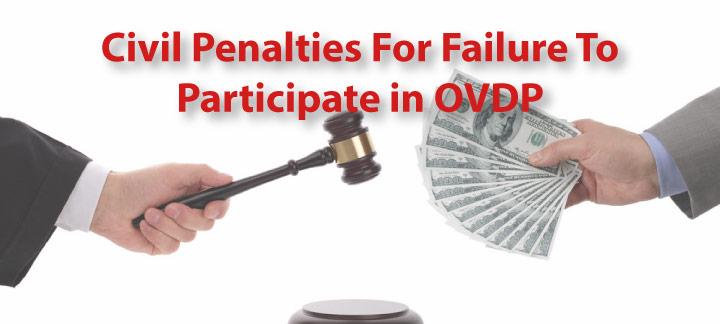Civil Penalties For Failure to Participate in OVDP
If a taxpayer who is eligible to participate in the Offshore Voluntary Disclosure Program fails to do so, he or she may be open to certain civil penalties if the IRS discovers the taxpayer’s nondisclosure of foreign accounts and assets. Depending on the taxpayer’s facts and circumstances, the following penalties may apply.
Failure to File FBAR Penalty
If the taxpayer with foreign accounts and assets fails to file an FBAR when required, a failure to file FBAR penalty may be imposed upon the taxpayer. The FBAR filing requirement applies to any U.S. person if the aggregate value of the person’s foreign accounts exceeds $10,000 at any point during the calendar year. This $10,000 threshold applies to the aggregate of any foreign account or asset held by the U.S. person, and the relevant amount for the purposes of the calculation is the maximum amount of each account or asset during the calendar year. The reporting obligation is triggered even if none of the applicable accounts exceeds $10,000 during the calendar year. Any U.S. person who is required to file an FBAR as a holder of a foreign bank account must also report the existence of the account on his or her U.S. income tax return.
The civil penalty for wilfully failing to file an FBAR report can be as high as $100,000 or 50% of the total balance in the account for the violation. A non-wilful violation comes with a lower penalty of $10,000 per violation.
Penalty for Failing to File Form 8938
Form 8938 is an IRS form which requires taxpayers to report their interest in certain foreign financial assets, including financial accounts, certain foreign securities, and interests in foreign entities. The penalty for failing to file each one of these information returns is $10,000, with an additional $10,000 added for each month the failure continues beginning 90 days after the taxpayer is notified of the delinquency, up to a maximum of $50,000 per return.
Penalty for Failing to File Form 3520
Form 3520, Annual Return to Report Transactions With Foreign Trusts and Receipt of Certain Foreign Gifts, requires taxpayers to report on certain transactions involving foreign trusts. If the taxpayer fails to file this form and has not participated in OVDP, a penalty may be imposed consisting of the greater of $10,000 or 35 percent of the gross reportable amount, except for returns reporting gifts, where the penalty is five percent of the gift per month, up to a maximum penalty of 25 percent of the gift.
Penalty for Failing to File a Tax Return and Pay Tax
Taxpayers may also be subject to accuracy-related penalties under IRC § 6651(a)(1) and failure-to-file penalties under IRC § 6651(a)(2). Under IRC § 6651(a)(1), a taxpayer who fails to file a tax return must pay a penalty of 5 percent of the amount due, with an additional 5 percent added for each month thereafter, but this amount cannot exceed 25 percent. Along the same lines, IRC § 6651(a)(2) imposes a penalty on tapxayers for failure to pay tax associated with the unfiled tax return. The section 6651(a)(2) penalty is equal to .5 percent of the amount of tax shown on the return, plus an additional .5 percent for each additional month or fraction thereof that the amount remains unpaid, not exceeding 25 percent.
Finally, IRC § 6662 imposes an accuracy-related penalty on underpayments, which may range from a 20 percent or 40 percent penalty.
How a Tax Attorney Can Help
If you have undisclosed offshore foreign accounts or assets, you may be eligible to participate in OVDP. In order to evaluate whether OVDP is the right decision for your international tax situation, you should consider consulting a knowledgeable international tax attorney. The OVDP program is rapidly changing, but a tax attorney can help you navigate the confusing aspects of the IRS program.
William D. Hartsock, Esq is a tax attorney in San Diego who has been successfully helping clients with tax issues related to their foreign assets since the early 1980s. Mr. Hartsock offers free consultations with the full benefit and protections of attorney client privilege to help people clearly understand their situation and options based on the circumstances of their case. To schedule your free consultation simply fill out the contact form found on this page, or call (858) 481-4844.



Comments (0)